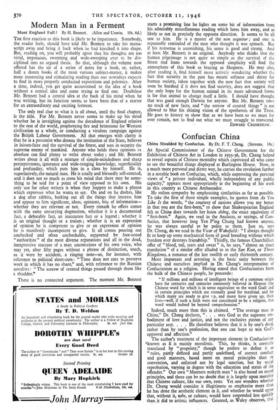Modern Man in a Ferment
Must England Fall ? By H. Bennett. (Allen and Unwin. 10s. 6d.)
Tao first reaction to this book is likely to be impatience. Somebody, the reader feels, should have told Mr. Bentiett to take his manu- script away and bring it back when he had knocked it into shape. But, reading on, you will probably agree that his thoughts are too vivid, impetuous, swarming and wide-sweeping ever to be dis- ciplined into an argued thesis. So that, although the volume now offered has the air of a series of notes for a book, or, rather, half a dozen books of the most various subject-matter, it makes more interesting and stimulating reading than one nowadays expects to find in more properly conducted expositions and polemics. After a time, indeed, you get quite accustomed to the idea of a book without a central idea and cease trying to find one. Doubtless Mr. Bennett had, a central idea at the back of his mind when he was writing, but its function seems to have been that of a starter for an extraordinary and exciting ferment.
The only real clue to what it is all about, until the final chapter, is the title. For Mr. Bennett never seems to make up his mind whether he is inveighing against the decadence of England relative to the rest of the world, prophesying fire and brimstone for Western civilisation as a whole or conducting a virulent campaign against the British Labour Government. All that emerges with clarity is that he is a pessimist who detests the institution of the State, believes in laissez-faire and the survival of the fittest, and sees in security the supreme enemy of mankind. Anyone who holds these opinions as absolute can find plenty to write about today ; and Mr. Bennett writes about it all with a mixture of simple-mindedness and sharp perceptiveness, ignorance and wide-ranging knowledge, superficiality and profundity, which puts him in a class by himself. He is, superlatively, the natural man. He is totally and blessedly self-centred, and it does not so much as cross his mind that there may be some- thing to be said for a point of view opposed to his own. His only use for other writers is when they happen to make a phrase which expresses what he wants to say. On and on he dashes, like a dog after rabbits, barking out all the things that interest him and appear to him significant, ideas, opinions, bits of information— whether they are relevant or not. Every remark he offers comes with the same unvarying dogmatism' whether it is a documented fact, a debatable fact, an inaccurate fact or a legend ; whether it is an original thought or a truism ; whether it is an expression of opinion he is competent to give or an expression of opinion he is manifestly incompetent to give. It all comes pouring out unchecked and often uncheckable, supported by foot-noted " authorities " of the most diverse reputations and all in the dead, inexpressive staccato of a man unconscious of his own voice, who may yet, after fifty pages without a phrase of distinction, touch, as it were by accident, a ringing note—as, for instance, with reference to political short-cuts : "Time does not care to preserve work in which it has no share," and, with reference to the Russian novelists : "The sorrow of created things passed through them like a shudder."
There is no connected argument. The moment Mr. Bennett
starts a promising line he lights on some bit of information from his admirably miscellaneous reading which lures him away, and as likely as not in precisely the opposite direction. It seems to be all one to him. He is a master of the non sequitur ; and one is repeatedly reminded of the man who thought it was spinach. But if his nonsense is astonishing, his sense is good and strong. And at least Mr. Bennett is an original. Anybody who thinks that the human pilgrimage is not quite so simple as the survival of the fittest and leans towards the opposed simplicity will find the atmosphere of this book as bracing as Skegness. He may also, after reading it, find himself more actively wondering whether the fact that security in the past has meant softness and decay for human society, taken together with the new fact that society will soon be finished if it does not find security, does not suggest that the only hope for the human animal in its more advanced forms is for that animal to change itself a little. I should have thought that was good enough Darwin for anyone. But Mr. Bennett takes no stock of new facts, and "the sorrow of created things" is not allowed to blur his shining vision of the apotheosis of the Trust. He goes to history to show that as we have been so we must for ever remain, not to find out what we must struggle to transcend.
EDWARD CRANKSHAW.






























 Previous page
Previous page